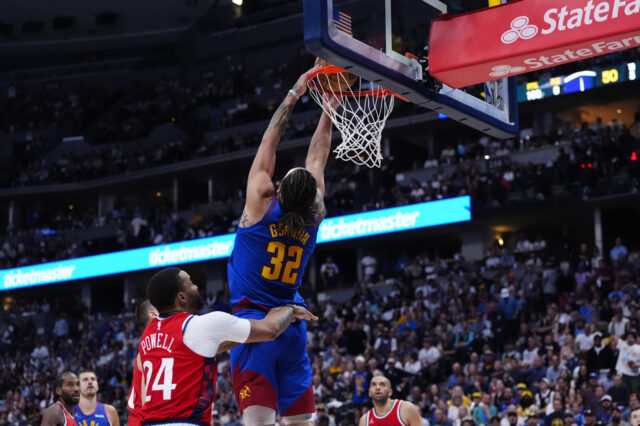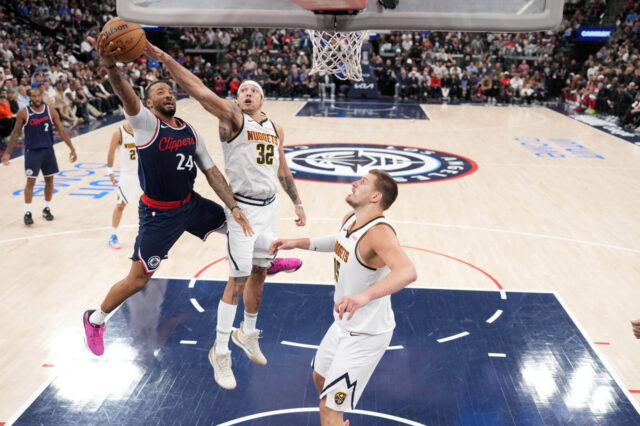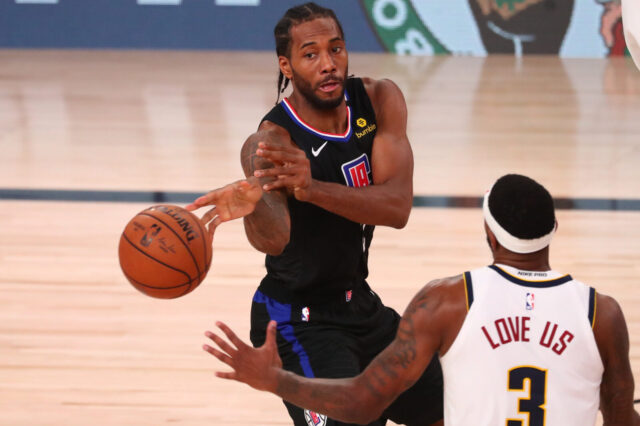At this point in the NBA season, the Denver Nuggets know enough about who they are to take a chance on their roster for the 2019-20 season. After the NBA trade deadline, the Nuggets are moving forward with 10 of the top 11 players in minutes played, deciding to exchange Malik Beasley (10th in minutes at 746), Juancho Hernangomez (12th, 422), and Jarred Vanderbilt (14th, 41) for Jordan McRae, Keita Bates-Diop, Noah Vonleh, and a late first round pick. With the shift in pieces at the back end of Denver’s rotation, the Nuggets made a statement: they believe in the group they have can compete for a championship, from Nikola Jokic as a superstar all the way down to Michael Porter Jr. as an X-factor. They added some additional pieces to get through the regular season, but the top 11 rotation players figure as the only real playoff hopefuls.
Let’s discuss those players in reverse order of minutes played and identify the one skill that will define each of them for the rest of the 2019-20 season.
Jordan McRae – Versatility
In Jordan McRae’s first game as a Nugget, head coach Michael Malone used him at small forward and power forward, playing in small lineups to counter the San Antonio Spurs and their three guard sets. He was effective as a floor spacer, mover of the basketball, and strong enough to match up with a 6-foot-8 Rudy Gay on the defensive end.
It’s very unlikely that McRae plays a role in the playoffs for the Nuggets. As a 6-foot-5 wing, he’s redundant with most of Denver’s current rotation members, especially Gary Harris, Will Barton, and Torrey Craig. All three figure to play a role, with Harris offering 3 & D potential at shooting guard, Barton handling creation and shooting duties offensively, and Craig handling 1-on-1 matchups defensively. Still, there may come a time where Harris or Craig aren’t effective enough defensively or Barton is struggling to create points efficiently. In that event, McRae is an excellent option that can wear different hats for both Denver’s offense and defense.
When the Nuggets first acquired McRae, I wrote about his scoring versatility and how it would give the Nuggets a boost. That hasn’t changed. McRae is a solid on-ball creator who was asked to do too much for a Wizards team bereft with scoring talent after Bradley Beal. He’s actually best as an off-ball scorer who can create shots for himself and others in a pinch. He also has the requisite length and a 7-foot wingspan to play passing lanes defensively. It’s hard to be taken seriously as a defender playing for the Wizards, but McRae is better than his numbers on that end.
If Will Barton, Gary Harris, or Torrey Craig sustain an injury or struggle in a playoff serious, McRae can certainly fill in. He’s capable of putting up points in a hurry, and he won’t be taken advantage of on the other end like Beasley or Hernangomez.
Michael Porter Jr. – Scoring potential
The Nuggets don’t quite know what they have in Michael Porter Jr. just yet, but the moves made at the deadline should give them a better idea. Porter has shown some excellent potential as both a 1-on-1 and off-ball scorer. Whether it’s from behind the arc, cutting to the paint, or settling for a contested midrange jumper, Porter has shown the capacity to make important shots.
The playoffs are full of important shots, and the Nuggets will need players on the court during those stretches that Malone can trust to make plays. We know Porter is talented, but we don’t know if he has gained Malone’s full trust in a contentious playoff series. The Nuggets are going to use the next 27 games of the regular season to figure that out. Can Porter reach another level as a scorer that can change a playoff series?
This is perhaps the biggest question surrounding the playoffs for Denver this year. Do the Nuggets have enough without Porter? Do they need Porter to make that final run? How far can his scoring potential go as just a rookie? Time will tell.
Mason Plumlee – 1-on-1 defense
When Nikola Jokic is off the floor, the Nuggets will need to have a plan of action. Last season, that plan involved the trio of Monte Morris, Malik Beasley, and Plumlee to keep Denver afloat as Jokic got a rest. It didn’t go so well. In the 14 playoff games, Jokic had a plus-minus of plus-84 in 556 minutes, while Plumlee sported a minus-75 in 218 minutes himself. The Nuggets could only try and survive while Jokic got his rest, and they rarely played teams even.
Was this entirely on the shoulders of Plumlee? Of course not. Monte Morris shot 0-for-13 from three-point range in the playoffs. Will Barton was a shell of the player he is today. Plumlee had a lot of burden to bear, but the fact is, it didn’t go well. Much of that was because Denver couldn’t defend while Jokic sat. Teams found a way to combat Plumlee’s defensive skills, and players like LaMarcus Aldridge and Enes Kanter found success.
The Nuggets may face several teams that feature bigs that can score in 1-on-1 situations. The Los Angeles Lakers of course have Anthony Davis, but the Los Angeles Clippers have Montrezl Harrell, the Dallas Mavericks have Kristaps Porzingis, and the Oklahoma City Thunder have Steven Adams. If Denver faces any of those teams, it will be nice to have some extra size to throw the opponent’s way, especially in cases when Denver’s bigs get into foul trouble. That’s the best way for Plumlee to make an impact: neutralize the big he’s going against and help the Nuggets win the minutes without Jokic on the floor.
This content is no longer available.
Torrey Craig – Big wing/forward defense
Torrey Craig has proven himself against guards. There’s no denying that anymore. The Nuggets have faced several teams with elite guards in which they decided to deploy Torrey Craig. His success rate is nearly 100%. Against players like Damian Lillard, Devin Booker, and Donovan Mitchell, some of the best scoring guards the NBA has to offer, Craig has thrived, even demoralized those players on several occasions.
His next task: finding a way to cover those pesky big wings and forwards.
LeBron James, Kawhi Leonard, Paul George, Luka Doncic, and James Harden are the big wings and forwards standing in Denver’s way of a trip to the NBA Finals. Very few players in the NBA can credibly guard those players. Most of the time, it’s just each other and a select few others that are up to the task. Torrey Craig isn’t one of those players yet, but he could become one. At 6-foot-6 and with a heart of iron, Craig will not stop until he finds a way to bother the above quintet on a consistent basis. If he can, he changes everything for the Denver Nuggets going forward. If he can’t, he may not be able to play big minutes in the playoffs against those teams.
Paul Millsap – Team Defense
So far, Paul Millsap’s track record for a team defender is close to spotless. Unfortunately for him and the Nuggets, Denver ran into a Portland team that didn’t need to go near him to create offense consistently. Lillard and CJ McCollum were such good perimeter scorers that they didn’t have to go at Millsap as the back line defender in the paint. In Games 6 and 7, Portland’s counter was to put Rodney Hood at the 4 in late game situations. That spaced Millsap away from the paint, allowing Lillard and McCollum more room to operate.
There are a few teams that will present a similar challenge, but they are big challenges. The Oklahoma City Thunder use Danilo Gallinari as their stretch forward. The Dallas Mavericks may put Porzingis at center to use Dorian Finney-Smith in the same way. The Clippers will have Marcus Morris. Millsap at age 35 will have one of his biggest defensive challenges. The only teams that genuinely play two bigs are the Lakers with Anthony Davis and the Memphis Grizzlies. The league has trended smaller. Can Millsap keep up on the perimeter?
Monte Morris – Three-point shooting
It’s well known that Monte Morris struggled from the three-point line in the playoffs last season. He was basically a rookie. A great rookie of course, but still a rookie. He went 0-for-13 from behind the arc during Denver’s playoff run, changing Denver’s entire bench offense in the process that relied on his perimeter spacing. Had Morris offered extra spacing, Denver’s bench may not have been so bad.
But players grow, and Morris spoke at length about how he learned from that experience, learned that the playoffs are a different beast than the regular season. If Morris is a different player, one that more closely resembles the 40.9% career three-point shooter he is in the regular season, that may provide enough boost while Denver’s starters rest. It’s clear that Murray is still struggling to keep his body healthy, and several 35-minute games will not help that cause. If Morris remains effective as a floor spacer, he may change a playoff game, even a series, for the better.
Jerami Grant – 1-on-1 Forward defense
Just like Torrey Craig, the value in Jerami Grant lies in what he can do against LeBron James, Kawhi Leonard, Paul George, Luka Doncic, and James Harden. Add Anthony Davis to that list as well. Grant has the kind of 1-on-1 defensive traits that teams look for in defensive stoppers: length, athleticism, functional strength to not be pushed around, and shot blocking instincts to finish the possession. Grant has done an honorable job on Kawhi, Giannis Antetokounmpo, and other big wings for the Nuggets this season and the Thunder in past years.
The real kicker is whether he can do so as a small forward or not. The Nuggets may be in situations where they want Jokic as the offensive anchor, Millsap as the back line defender, and Grant as a 1-on-1 matchup. If Craig struggles with the above players in his matchups, Denver may have to slide Grant to the 3 in many situations. That’s a lineup they have barely tested, with the only significant time coming against the Lakers last game. It didn’t go so well then, but can it work in the future?
This content is no longer available.
Jamal Murray – Creating off the dribble
I’m cheating here. Creating off the dribble is very ambiguous and covers both scoring and passing, but that’s the most important factor for Jamal Murray. What kind of player can he really be with the ball in his hands? Can he reach the level of a Damian Lillard at any point? An All-NBA caliber guard in complete control of the situation, creating points primarily for himself but also for others since he’s so dangerous. That would be the ideal for Murray, especially the part about being able to pull up for a three-pointer anywhere on the court and shooting with confidence.
Or is Murray more of a Donovan Mitchell or Russell Westbrook level of shooter? Those guys weren’t afraid to shoot in the playoffs last year, but up against a matchup that wasn’t favorable for either of them, both guards were horribly inefficient, dragging down the offense for their respective teams and leading to first round exits. That would be an awful outcome for Denver, because their options for volume scoring and creating off the dribble at a competent level are limited to just Will Barton after that.
Lately, Murray has appeared a lot more like Lillard, averaging a healthy number of shot attempts from beyond the arc and converting at an elite rate. That version of Murray gets Denver past both the Lakers and Clippers to an NBA Finals matchup with the Milwaukee Bucks. The other version? That could lead to an unfortunate first round exit and lots of offseason questions.
Gary Harris – Shooting
Another very self-explanatory skill that defines a Nuggets rotation player. Gary Harris is shooting 29.9% from behind the three-point line. Among all 154 NBA players to attempt at least 150 threes (Harris is at 184), the Nuggets starting shooting guard ranks 147th. The only players with a worse three-point percentage: Brook Lopez, Vince Carter, Malik Monk, Jarrett Culver, Jordan Poole, Julius Randle, and Russell Westbrook. Along all starting shooting guards, Harris ranks second to last.
There’s no need to belabor the point on this one. If Harris can’t shoot, it’s really hard to play him a high volume of minutes. At some point, teams will just dare Harris to beat them from the perimeter, collapsing on everything the Nuggets do with Murray and Jokic. It just can’t happen like that, no matter how strong his defense is against guards.
This is probably Denver’s second or third biggest question, depending on how much one thinks Porter will actually play. Harris has been part of Denver’s core for over five years. The Nuggets have committed to him. They traded Malik Beasley because they believe in Gary Harris figuring out the shooting again. Things will be so much easier for Malone if Harris gets back to his efficient ways from a couple years ago, but by extension, Malone’s life gets really difficult if Harris can’t figure it out.
Will Barton – Elite levels of creation
Only three players in the NBA are currently averaging over 15 points, 6 rebounds, and 3 assists per game while exceeding 38% from three-point range: Will Barton, Khris Middleton, and Brandon Ingram. AKA, two All-Star wings and Will the Thrill. Barton has been a revelation this year. After taking some needed time during the previous offseason to fully recover and get his body right, Barton is back to being his standard versatile self, capable of doing everything on the floor. He can score when needed, create for others, grab key rebounds, and defend at a high level in most situations.
He represents the term “Jack of All Trades” very well. He’s not quite as big as most elite wings, doesn’t score as much, doesn’t rack up as many assists, and doesn’t have the reputation of a lockdown defender. Still, he’s solid in all of those areas, better than solid in many cases, and he could be the piece Denver was missing in the second round last year against Portland: a strong secondary dribble creator to go with Jamal Murray.
That’s the question though: can this level of production be sustained in a playoff setting? When Barton has to face Paul George, or James Harden, or Luka Doncic, or Shai Gilgeous-Alexander on a consistent basis, how will his combination of production and spacing hold up? Can he continue being a 38% three-point shooter?
If the answer is yes, the Nuggets may not need Michael Porter Jr. just yet.
This content is no longer available.
Nikola Jokic – LeBron level dominance
Very few players can match up with Nikola Jokic on a consistent basis and potentially come away better than him. The only two who come to mind: Anthony Davis and Joel Embiid (more in theory for Embiid rather than in practice). Even factoring in those two elite, All-NBA caliber players, there may be no big man in the NBA that is more impactful on the offensive end than Jokic. His scoring versatility is high, the assists he creates are legendary, and he’s an absolute beast on the boards when he sets his mind to it.
But there’s another tier he can reach as a scorer and playmaker that only five other players in the NBA can reach: LeBron James, the injured Kevin Durant, and the injured Stephen Curry. Those three have shown the ability to absolutely take over a game when the need arises. LeBron does it several times a year when he just hits another gear that only one other player in history can say they’ve hit before. Durant and Curry are both versatile, and when they reach supernova levels, nothing and no one can stop either player.
Jokic hasn’t hit that yet. He may never hit it. He averaged 25 points, 13 rebounds, and 8 assists per game during the playoffs last year. The resulting Box Plus-Minus of Plus-11.8 ranks 7th all-time among players to exceed 500 playoff minutes. The other six season? Three seasons of LeBron, and three seasons of some dude named Michael Jordan.
Can Jokic recreate that level of dominance against better competition than Enes Kanter and LaMarcus Aldridge? When he faces a player like Anthony Davis, can Jokic hit another gear or at least maintain his elite production against a generational big man talent? If Jokic once again has a huge advantage against a team like the Clippers, can Jokic be dominant in the same way Kawhi Leonard was in the playoffs last year? Can he have games where he puts up 30, 15, and 15, or maybe even a repeat of his 43-point performance in Game 6 against the Spurs last playoffs?
Time will tell.


